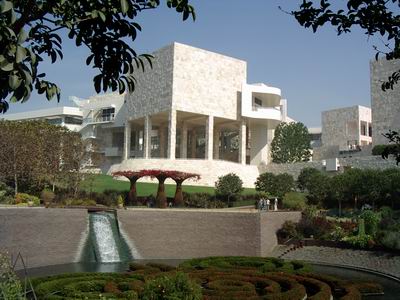Too Posh for Me - and some profound thoughts
This has to be the poshest hotel I've ever been in. The minibar has its own checkout counter (no - not really) and the room has a cordless phone. I'm going to see how far away I can get before it stops working. I wonder if it would work in Hull?
I've signed up for an internet connection from the room (obviously) but the deal comes with free local and national USA phone calls. If only I knew someone in the USA to actually ring up.
The minibar is amazing. In a sprit of enquiry and starvation I purchased a small bag of nuts. The system can detect when the bag is removed and gives you 30 seconds to replace it. If you don't it bills your room automatically. I've no idea how the sensor works. Think I might challenge David to a game of "Minibar Chardonnay (price 12 dollars ) Chicken" - once I've worked out the rules, This is the obligatory view from my room shot:

That little white blob just above top centre is the Hollywood sign....
After breakfast (I'm starting to like yoghurt - which is scary) we went up to the Getty museum. This entailed a cab ride (everything in LA seems to involve using the road) and a trip up a little tram to get there. We were blessed with amazing weather and the place is, amazing. Anyone who knows me well will know that words don't fail me often. Well they do here. Outside amazing architecture and views. Inside fantastic paintings and sculptures. Blimey.

This is just one view of the place. I have another fifty or so, equally as good. After lunch (I had some Microbrewed Soda from here) we went to place called Fry's. This is a huge electronics shop. And I mean huge. The outside had a spaceship crashed into it.

The motif continued inside (where you weren't allowed to take photographs) and had a whole bunch of set pieces. And I was so impressed I didn't buy anything.
Later in the evening we went to a discussion panel about teaching programming. Due to the LA traffic we arrived too late to hear the bulk of the session, but what we heard was very interesting. The lecturers there were preoccupied with the same issues that we grapple with at Hull. The field of computing changes so fast that teaching it is very tricky. You have to decide whether or not to teach the latest stuff. If you do, you run the risk of missing out on important fundamentals. If you don't you may not be equipping your students for the future. I kind of take the middle ground here, you have to deliver some core skills, and work on giving people the ability to pick up new skills as they go through their careers. And you have to inform people of the fact that they will have to do this.
I learnt to program using punched cards (no - really). We got three runs a day of our programs; four if we were lucky. You got quite keen on "right first time" because for a two week project you probably only had around fifty or so attempts to get it working. I think these days many programmers use that many goes in a singe session! I've lost count of the number of operating systems and application programmer interfaces that I've had to work with over the years. And of course now we have objects and stuff which plain weren't around when I started. And yet I seem to do OK, as do most of our graduates.
There was some discussion about how much low level stuff to teach (sorry if this is boring you folks - but it is what I do for a living..). The question is interesting and scary. Does a programmer need to know how a computer actually works? Does a driver need to know the precise details of the workings of the internal combustion engine? I have a problem here, in that for various sad reasons I like knowing how things work. The interval between acquiring a new toy and taking the back off to see how it works is usually pretty short in my case. And I kind of worry about programmers who don't have that interest. It's probably not fair for me to do this, but there you are. We teach hardware at Hull and keep trying new and inventive methods to make it more interesting. I think at the end of the day you'll find that the most successful racing drivers are those who know how their cars work and can discuss them with their mechanics...
One other thing that was interesting was that the man from Microsoft told us their solution to this problem. They try to hire smart people. They have figured out that their business moves at such a rate that these folks have the best chance to keep up. Go for a Microsoft job and you will be confronted by a whole bunch of puzzles and brainteasers apparently. And the really cunning thing is (hope I'm not giving too much away here folks) is that they are not massively interested in whether you solve the problem. They are interested in the approach that you take, and how you try to prove that your solution is valid. I think their priorities are "Can we work with this person?", "Are they smart?","Are they focussed?" and "Do they have useful skills?". In that order. Any Microsoft bods reading this feel free to contact me to put me right, but I know that if I was hiring - that is the order I'd go for as well...
I've signed up for an internet connection from the room (obviously) but the deal comes with free local and national USA phone calls. If only I knew someone in the USA to actually ring up.
The minibar is amazing. In a sprit of enquiry and starvation I purchased a small bag of nuts. The system can detect when the bag is removed and gives you 30 seconds to replace it. If you don't it bills your room automatically. I've no idea how the sensor works. Think I might challenge David to a game of "Minibar Chardonnay (price 12 dollars ) Chicken" - once I've worked out the rules, This is the obligatory view from my room shot:

That little white blob just above top centre is the Hollywood sign....
After breakfast (I'm starting to like yoghurt - which is scary) we went up to the Getty museum. This entailed a cab ride (everything in LA seems to involve using the road) and a trip up a little tram to get there. We were blessed with amazing weather and the place is, amazing. Anyone who knows me well will know that words don't fail me often. Well they do here. Outside amazing architecture and views. Inside fantastic paintings and sculptures. Blimey.

This is just one view of the place. I have another fifty or so, equally as good. After lunch (I had some Microbrewed Soda from here) we went to place called Fry's. This is a huge electronics shop. And I mean huge. The outside had a spaceship crashed into it.

The motif continued inside (where you weren't allowed to take photographs) and had a whole bunch of set pieces. And I was so impressed I didn't buy anything.
Later in the evening we went to a discussion panel about teaching programming. Due to the LA traffic we arrived too late to hear the bulk of the session, but what we heard was very interesting. The lecturers there were preoccupied with the same issues that we grapple with at Hull. The field of computing changes so fast that teaching it is very tricky. You have to decide whether or not to teach the latest stuff. If you do, you run the risk of missing out on important fundamentals. If you don't you may not be equipping your students for the future. I kind of take the middle ground here, you have to deliver some core skills, and work on giving people the ability to pick up new skills as they go through their careers. And you have to inform people of the fact that they will have to do this.
I learnt to program using punched cards (no - really). We got three runs a day of our programs; four if we were lucky. You got quite keen on "right first time" because for a two week project you probably only had around fifty or so attempts to get it working. I think these days many programmers use that many goes in a singe session! I've lost count of the number of operating systems and application programmer interfaces that I've had to work with over the years. And of course now we have objects and stuff which plain weren't around when I started. And yet I seem to do OK, as do most of our graduates.
There was some discussion about how much low level stuff to teach (sorry if this is boring you folks - but it is what I do for a living..). The question is interesting and scary. Does a programmer need to know how a computer actually works? Does a driver need to know the precise details of the workings of the internal combustion engine? I have a problem here, in that for various sad reasons I like knowing how things work. The interval between acquiring a new toy and taking the back off to see how it works is usually pretty short in my case. And I kind of worry about programmers who don't have that interest. It's probably not fair for me to do this, but there you are. We teach hardware at Hull and keep trying new and inventive methods to make it more interesting. I think at the end of the day you'll find that the most successful racing drivers are those who know how their cars work and can discuss them with their mechanics...
One other thing that was interesting was that the man from Microsoft told us their solution to this problem. They try to hire smart people. They have figured out that their business moves at such a rate that these folks have the best chance to keep up. Go for a Microsoft job and you will be confronted by a whole bunch of puzzles and brainteasers apparently. And the really cunning thing is (hope I'm not giving too much away here folks) is that they are not massively interested in whether you solve the problem. They are interested in the approach that you take, and how you try to prove that your solution is valid. I think their priorities are "Can we work with this person?", "Are they smart?","Are they focussed?" and "Do they have useful skills?". In that order. Any Microsoft bods reading this feel free to contact me to put me right, but I know that if I was hiring - that is the order I'd go for as well...


0 Comments:
Post a Comment
<< Home